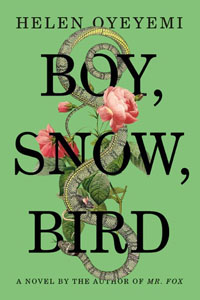
Read Along with Faye is a new series of book reviews and commentary by Faye Bi on the Sirens communications staff, in which she attempts to read 25 books and complete the 2016 Sirens Reading Challenge. The series will consist mostly of required “theme” books and will post monthly. We invite you to read along and discuss! Light spoilers ahead.
It took me a long time to process Helen Oyeyemi’s Boy, Snow, Bird. There were so many things I loved about it—and so many elements that were done brilliantly. The novel starts off from Boy’s, a young white woman’s, point of view set in the 1950s in New York City. Her abusive, drunken father is a rat catcher and Boy takes her first opportunity to hightail it outta there to a small town in Massachusetts, where she meets Arturo Whitman, a light-skinned widowed craftsman and former history professor.
Yes, light-skinned. Because Oyeyemi uses the classic fairy tale of Snow White, with her “skin as white as snow” as a departure point for a truly bold and nuanced portrayal of racial passing. At first, Boy becomes entranced to Arturo’s daughter from his first marriage, Snow, who is so pale, so graceful and beautiful she is practically alight with a virtual halo. After Boy marries Arturo, she gives birth to the dark-skinned Bird and discovers that the Whitmans have passed as white, or “light enough,” for generations, shunning and ignoring their darker-skinned relatives. Particularly noxious is Olivia, Arturo’s mother, who treats her granddaughter Snow as a treasure to be worshipped and fawned over. For Olivia, Snow represents what her race and her family could be—not black. “Snow’s beauty is all the more precious to Olivia…because it’s a trick. When whites look at her, they don’t get whatever fleeting, ugly impressions so many of us get when we see a colored girl—we don’t see a colored girl standing there.” Contrast this to the aloofness and (hopefully unintentional) shame she has towards Bird.
Boy begins fulfilling the role of the supposed wicked stepmother in the Snow White tale, though Oyeyemi cleverly weaves in the setting of early Civil Rights America and themes of motherhood, race, beauty and identity that she imbues the motifs with new meanings. Boy sends Snow away to live with her dark-skinned Aunt Clara and her husband, far away from Bird, Arturo and Olivia. One could argue that Boy’s act is cruel, and in fact, many would—but even Snow herself, in later chapters narrated by Bird, admits in a letter:
“I may or may not have hated my own face sometimes. I may or may not have spent time thinking of ways to spoil it somehow… But I’m slowly coming around to the view that you can’t feel nauseated by the Whitmans and the Millers without feeling nauseated by the kind of world that’s rewarded them for adapting to it like this.”
Would she ever have come to this conclusion had she stayed in Massachusetts? Boy’s act of sending her away forces Snow to see herself in a new light, instead of becoming part of the same warped system that has rewarded the Whitmans for passing, because ugh, racism is real. And on the other hand how can you blame Olivia, who has lived within this system all her life in fear of being discovered she’s actually ‘colored’?
But where Boy, Snow, Bird exceeds all expectations in delving into the implications of racial passing, with beautiful, poetic writing and the careful weaving of a classic fairytale, it fails spectacularly when it comes to gender. The last twenty pages of the book didn’t completely ruin the book for me, but I could easily see it ruining it for other readers. I will avoid major spoilers, but the plot lurched and took a sudden turn for the random and for the worse. It didn’t relate thematically to the rest of the book, and problematically attempted to address a trans character’s identity through rape, self-loathing, mental illness and trauma. I had such a negative reaction to it I would advise fellow readers to just avoid the last twenty pages altogether.
I still loved Boy, Snow, Bird for the insight it offered me, but due to the last twenty pages (and a very annoying character—Boy’s “friend” Mia) I’d recommend it with reservations.
Next Month: The Strange Way of Dying by Silvia Moreno-Garcia
Faye Bi works as a book publicist in New York City, and is a member of the Sirens communications team. She’s yet to read an immigrant story she hasn’t cried over, and is happiest planning nerdy parties, capping off a long run with brunch, and cycling along the East River.







Connect with the Sirens community
Sign up for the Sirens newsletter